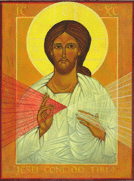In the first place, there is a purely visible element, consisting of the commission, the election, the choice, the mandate. These terms are synonymous. This commission refers to the act by which the local Christian community, or the bishop, acting in the name of that community, designates a particular man to exercise the priestly ministry. The priesthood should never be obtained by unworthy means. He who appears to be the best candidate is the one who should be chosen.
The call to the priesthood involves a second aspect which is both visible and invisible: the laying on of hands, otherwise called the "ordination." Priesthood is not conferred simply by majority vote within a Christian community. Through ordination, the new priest must be publicly and officially integrated into the long line of priests upon whom bishops have laid hands. Responsible for transmitting the witness and the faith of the Apostles, the bishop unites the new priest to the apostolic tradition. The rites of ordination give visible expression to this continuity. But such continuity cannot be a merely external factor. The apostolic succession of bishops and priests does not consist in a series of ordinations beginning with the earliest days of the Church and continuing down to the present day. It implies rather a definite grace, linked to the grace received by the apostles and disciples of jesus. The same Holy Spirit is given to them all. The priest should hold this spiritual geneology in highest esteem. He should read and meditate upon the words of the ordination ceremony, discovering in them evidence of apostolic holiness. He should aspire to this same holiness and thus make, or remake, of the sacrament of Holy Orders something other than an "institution." He should make of it a fundamental event of his own spiritual life.
Finally, there is a purely invisible aspect of the call to priestly ministry. No one should accept priesthood who has not had the conscious experience, at least once in his life, of encountering the Lord Jesus in an intimate way, of hearing His call directed personally and directly to Himself. "Be my priest" - MY Priest: not only him whom the Church sends in my name, but him whom I myself have chosen, him who belongs to me and whom I have embraced with my whole heart. Both before and beyond the call of the bishop and of the community, there should be that secret call which Mary heard at Bethany, and which every priest should have heard: "The Teacher is here and is calling you." (John 11:28). It is not we who first love and choose Jesus; it is He who has loved and chosen us.
What is our response to this divine call?
Some have heard the call and have always remained faithful to it, despite the inevitable weaknesses of the human condition. Such priests, to be sure, are rare. And they are happy and blessed.
Others have become priests without ever having heard a personal call. Purely personal considerations led them to assume the priesthood. Sometimes they have accepted it with good intentions, but without any living and personal relationship with the Lord Jesus. Such priests, however, should by no means accuse themselves of having acted improperly or think that they are condemned. There is still time, and the time is always now, to open one's heart to the voice of Jesus and to hear His invitation. They can hear it now, if they have not done so already. And if they feel that the Lord remains silent, at least their faith and their good will can serve as a positive response to the call which is at this very moment implicit in their ministry.
Many others have heard the call. But then temptation and weariness set in after some time in the priesthood. They fell, and their fall was great. They fell again and again. Yet they did not lose the hope that God would turn towards them, raise them up, confirm them in their ministry, and heal them. May they never cease to hold fast to the Savior and to cry out to Him, "Lord, he whom you love is ill." (John 11:3)
Then there are those who have lost courage, who have settled into a life of unbelief and sinfulness, who have remained priests in spite of themselves and who wish they had never been ordained. It seems to them the call no longer exists. Or perhaps they never heard it in the first place. The Lord appears to be far from them. But in reality, how very close to them He is! He enfolds with His tenderness and compassion these lost sheep, these lost shepherds. If one of them should read these words, may he remember the parable of the Prodigal Son. May he rise and go toward the Father, whose loving arms are outstretched towards him. "Today, when you hear His coice, do not harden your hearts..." (Hebrews 3:7-8).
And to each of us, priests and sinners that we are, St. Paul declares: "Do not neglect the gift you have, which was given you by the laying on of hands." (1 Timothy 4:14)
Lord Jesus, grant that we may hear Your call. Let us hear it once again, if we have heard it already in the past. If we have not yet heard it, let us hear it now. Grant that this call may never cease to resound within my soul. You have said to me, "Be my priest." I want to be Your priest. you know the gulf that separates me from You. Every step I take, I fall; yet I try to raise myself up and to come to You. You will never reject him who comes to you bearing so many sins, but with such humble trust. "He who comes to me, I will in no way cast out." (John 6:37)

No comments:
Post a Comment